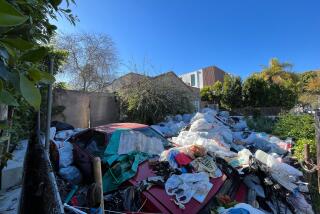Neighborhood eyesore can hurt chances of selling
- Share via
When Vicky Black’s one-story home in Port Richey, Fla., was on the market, prospective buyers told her they liked it. Unfortunately, they made negative comments about her neighbor’s home, which has a stone lawn and little curb appeal.
“They said I was the gem of the neighborhood, and it was too bad I had eyesores around me,” recalled Black, who took her house off the market last year.
The appearance of nearby homes absolutely influences homeowners’ ability to sell, said Pat Vredevoogd Combs, former president of the National Assn. of Realtors.
“One house that’s an eyesore affects everybody,” said Combs, a real estate agent in Grand Rapids, Mich.
It’s a problem that has grown with the nation’s foreclosure rate, she said, as many foreclosed properties go into disrepair. Problems can include uncut grass, broken windows and trash in the yard.
Combs recommends that sellers and real estate agents take action toward cleaning up unsightly properties.
She has encouraged clients to phone neighbors and ask them to address the problem or, in the case of a foreclosure, to take care of it themselves.
“The agent could help if need be,” she said. “It’s better if it’s owner to owner.”
She recommends handling neighbors delicately.
“You can’t go right at them with ‘You dirty bums, how come you’re so messy?’ ” Combs said.
She suggests telling delinquent neighbors that a real estate agent or potential buyer complained. It’s also a good idea to have a solution and to offer to help with the fix, Combs said.
If homeowners are uncomfortable contacting their neighbors, real estate agent Greg Perry is happy to do it. He’s had varying degrees of success.
Some neighbors have seen the value of improving their property, others haven’t, said Perry, who sells homes in Kirkland, Wash.
“You run into all kinds of people,” he said. “There are belligerent people in life, and there are accommodating people in life.
“A lot of agents need to think a little bit outside of the box,” Perry said. “I’m always willing to help my seller out, and sometimes that means actually arranging for the neighbor’s cleanup. I’ve done it on my own dime.”
Approaching the neighboring homeowner is the most appropriate first step, said Carl Smart, president of the American Assn. of Code Enforcement.
“A friendly call from a neighbor is often very much appreciated” over a complaint to the local code enforcement office, said Smart, an executive assistant in the Fort Worth city manager’s office. “Sometimes, it’s not so pleasant. At least you tried before moving forward with code officials.”
If a phone call fails to resolve concerns, he recommends contacting the local code enforcement office or neighborhood association.
Representatives of those organizations will know whether the issue violates local codes, Smart said. Often people are disappointed to learn that their neighbor is not breaking any rules, he said.
Nor does filing a complaint guarantee an instant remedy, he said.
Although some homeowners do immediately address the issues, others may appeal the complaint or take their time fixing the problem.
He recommends asking the homeowner before doing any work yourself.
“If they accept, everything is fine,” he said, otherwise, it’s trespassing.
“It’s kind of a neighborly approach,” he said. “It’s very much akin to a neighborhood cleanup.”
Combs, the Michigan real estate agent, encourages clients to take turns on maintenance chores, such as cutting the grass or cleaning up the yard.
“People say, ‘This looks terrible. Why isn’t somebody doing something?’ ” she said. “Well, guess what? It’s your neighborhood. It’s only hurting you. People have to start stepping up.”
More to Read
Inside the business of entertainment
The Wide Shot brings you news, analysis and insights on everything from streaming wars to production — and what it all means for the future.
You may occasionally receive promotional content from the Los Angeles Times.










